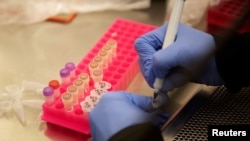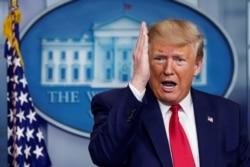India has lifted a ban to allow limited exports of an anti-malaria drug sought by U.S. President Donald Trump. Hydroxychloroquine has attracted attention as a possible treatment for coronavirus, although there is no conclusive evidence that it fights the infection.
Trump told reporters Monday at a White House press briefing in Washington that he had asked Prime Minister Narendra Modi during a phone call over the weekend to ensure the supply of hydroxychloroquine (HCQ).
“I said, ‘we’d appreciate your allowing our supply to come out.’ If he doesn’t allow it to come out, that would be ok, but of course, there may be retaliation. Why wouldn’t there be?”
Trump has called the drug an important treatment for COVID-19.
India is one of the world’s main producers and suppliers of generic drugs.
On Tuesday, India Foreign Ministry spokesman Anurag Srivastava said, “It has been decided in view of the global pandemic that India will license paracetamol and HCQ in appropriate quantities to all our neighboring countries, as well as those who have been badly affected by the pandemic.”
Srivastava said India has received requests from almost 30 countries, including the United States, Brazil, Gulf and African nations, along with South Asian countries such as Nepal.
According to officials, the decision was taken after confirming the availability of medicines for all possible contingencies in the country.
India restricted last month the import of some common medicines including hydroxychloroquine, the widely used pain reliever paracetamol, certain antibiotics and various vitamins as the number of coronavirus cases surged across the globe.
There is no conclusive evidence that hydroxychloroquine helps treat coronavirus, although there have been some studies to test its efficacy as an anti-viral medicine. Clinical trials to test it for coronavirus treatment are underway in several countries like France, China, the United States and Britain.
But these trials have yet to be completed and many scientists caution against the drug’s use without more studies. An article in the medical journal, Lancet, has warned that hydroxychloroquine can have dangerous side effects if the dose is not carefully controlled.
India advocates health care workers take the drug regularly as a preventive measure, but a senior scientist with the Indian Council of Medical Research has said the present policy is that the drug is not to be used by everyone.
"It is being given to doctors and contacts of lab confirmed cases. When their data will be compiled only then a call can be taken whether it should be recommended to everyone," Raman R. Gangakhedkar, told reporters last week.
India now has recorded about 4,500 cases of the virus and more than 114 deaths – a small number compared to several other countries. There are fears, though, that those numbers could rise if it spreads into densely packed urban slums.





